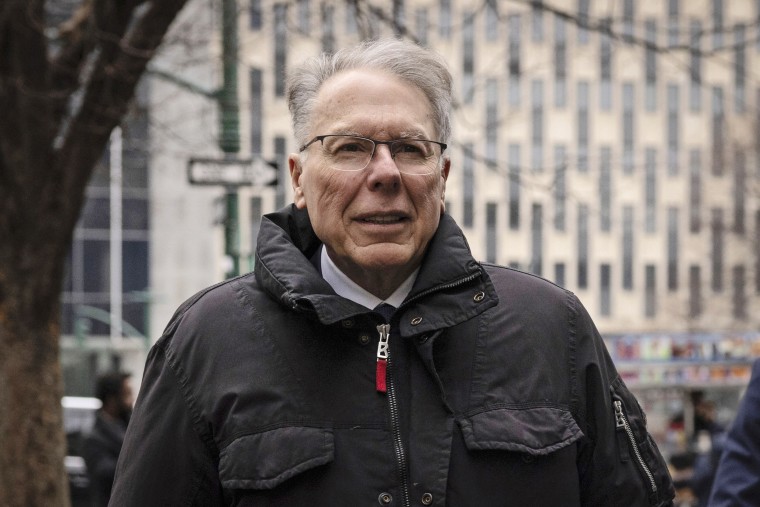National Rifle Association leader Wayne LaPierre testified Monday that he authorized thousands of dollars in helicopter rides so that executives of the gun rights group could avoid getting stuck in traffic while traveling to and from NASCAR races.
On his second day on the stand in his civil corruption trial, LaPierre, 74, was shown three invoices for helicopter services, totaling more than $16,000. He confirmed that he approved those flights in 2015 and 2016 and said helicopter trips were a “practice” at the time.
LaPierre, other former and current NRA leaders and the organization itself are fending off a lawsuit brought by New York Attorney General Letitia James in 2020 that alleges they violated nonprofit laws and redirected millions of dollars of NRA funds for personal use.
The helicopter rides were the attorney general's latest example of that alleged spending.
One of those flights cost $7,590, LaPierre confirmed. Kayne Robinson, who served as the NRA’s president from 2003 to 2005, was the single passenger.
LaPierre testified Friday that he used the NRA’s funds on chartered private jets, family trips, black car services and high-end gifts for friends.
On Monday morning, he was shown and confirmed the validity of multiple invoices, including one for a December 2015 private plane flight from Washington, D.C., to the Bahamas that cost nearly $19,000.
Assistant Attorney General Jonathan Conley also directed LaPierre to clothing purchases made by Ackerman McQueen, the NRA's advertising and public relations firm at the time, totaling more than $274,000.
LaPierre confirmed that he did buy clothing at Zegna, a high-end clothing store in Beverly Hills, California. But he insisted that he did so only at the behest of the officials at Ackerman McQueen, who "hated" how he dressed and encouraged him to buy new clothes that would look good on television.
“Mr. McQueen used to literally beat me up to get wardrobe at this store," LaPierre said. "I did all the television for the NRA."
LaPierre said he spent more than $29,000 at Zegna in March 2014 and another $39,000 there in September 2015.
He has long been the NRA’s public face, and he once hosted a television program called “Crime Strike” that was co-produced by Associated Television. The company is owned by David McKenzie, who regularly hosted LaPierre on his luxury yachts in the Bahamas.
Throughout his testimony Monday morning, LaPierre appeared calm and answered most questions with a “yes” or “no.”
He became more animated — gesticulating with his hands and giving more detailed answers — once the NRA's attorney began questioning him.
During that cross-examination, LaPierre testified that it was “wrong” to charter private planes and limo services for personal use. He said he repaid what he owed the NRA with interest, although he did not specify exactly which expenses he paid back.
He also detailed what grew to be a contentious relationship with the Ackerman McQueen firm once the NRA underwent a financial course correction. LaPierre said leaders at the firm called him a “stupid fool” and used other “hateful” and “nasty words” when he said he had asked to see Ackerman McQueen’s records to be compliant with New York nonprofit law.
“The more they were determined to not have us see their books and records, the more determined I became to see their books and records,” LaPierre said.
He said Ackerman McQueen officials unleashed “every nasty cuss word under the sun” during the ensuing months.
The Manhattan civil trial entered its fourth week Monday.
The other defendants, including the NRA itself, are accused of violating nonprofit laws and internal policies as they enriched themselves, according to the lawsuit, contributing to the gun rights group’s loss of more than $64 million in three years.
They are Wilson “Woody” Phillips, a former NRA treasurer and chief financial officer, and John Frazer, the corporate secretary and general counsel.
If the jurors find LaPierre, Phillips or Frazer liable, they will recommend the amount of money that each would have to repay the NRA.
State Supreme Court Judge Joel Cohen, who has the final say over monetary damages and remedies, could determine whether the defendants should be permanently barred from serving on the board of any charity in New York and whether an independent monitor should oversee the NRA’s finances.
Citing health issues, LaPierre has previously said that he intends to resign Jan. 31 from the gun rights group, which he has led for more than 30 years as its executive vice president.
LaPierre testified Monday that he does not feel entitled to any payment now that he has stepped down.


